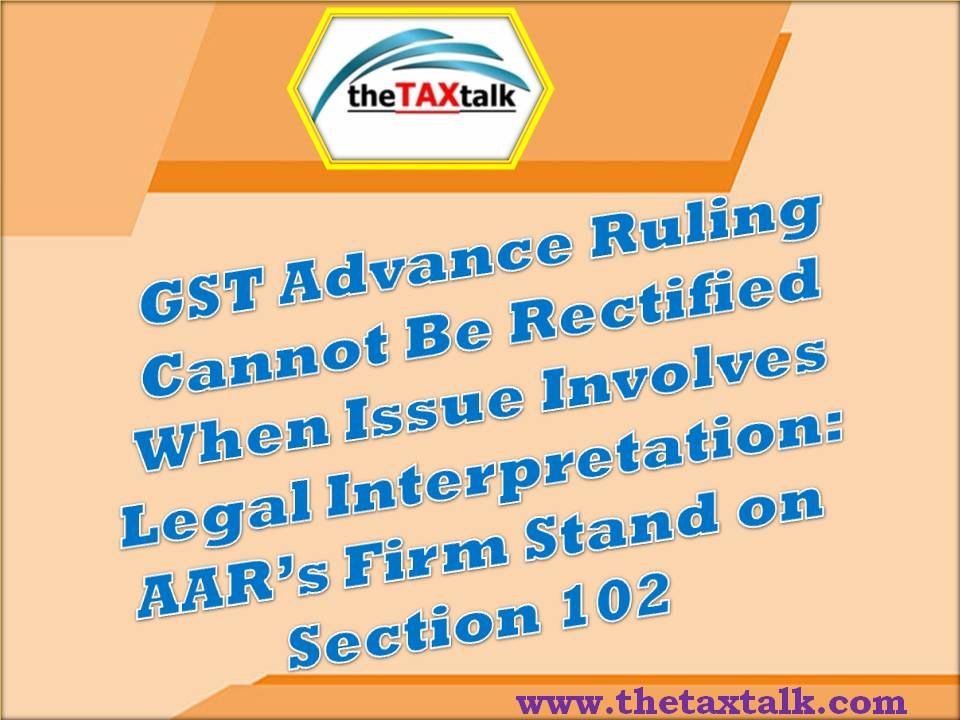![]()
GST Advance Ruling Cannot Be Rectified When Issue Involves Legal Interpretation: AAR’s Firm Stand on Section 102
The recent ruling in the case of Webel Support Multipurpose Service Cooperate Society Ltd., In re [2025] 174 taxmann.com 11 (AAR – West Bengal) has reaffirmed a crucial limitation under the GST law: rectification of a mistake under Section 102 cannot be used to revisit matters involving legal interpretation.
This decision, dated 27th February 2025, may appear technical at first glance, but it holds broader significance for businesses relying on advance rulings and seeking clarifications under GST.
The Background
The applicant, Webel Support Multipurpose Service Cooperate Society Ltd., had received a work order from Webel Technology Limited for supplying manpower services to the Public Health Engineering Directorate (PHED) of the Government of West Bengal. These services were provided for the ‘Jal Jeevan Mission’, a central government initiative to ensure safe and adequate drinking water.
The applicant approached the West Bengal AAR (Authority for Advance Ruling), claiming that the services rendered were ultimately meant for a government department and thus eligible for exemption under Serial No. 3 of Notification No. 12/2017-Central Tax (Rate), dated 28-06-2017, which exempts pure services provided to the Government or local authority for a governmental function.
The Original Ruling
The AAR rejected the applicant’s claim and held that the services were being provided to Webel Technology Limited, a government-controlled corporation, and not directly to the PHED. Accordingly, the benefit of exemption could not be extended.
This ruling drew a clear distinction between the actual recipient of services (Webel Technology Limited) and the end-user (PHED), and concluded that the exemption under Notification No. 12/2017 could not be availed.
The Rectification Request
Aggrieved by the ruling, the applicant did not file an appeal under Section 100 of the CGST Act. Instead, it sought rectification of the ruling under Section 102, arguing that:
• Webel Technology Limited is merely a conduit and is, in turn, providing the same services to PHED, which had already been granted exemption by AAR in an earlier case.
• Therefore, the ruling ignored this factual parity, which should be treated as a mistake apparent from the record.
AAR’s Response: No Room for Legal Reconsideration Under Section 102
The AAR outrightly rejected the rectification application, stating that:
“Any mistake which is manifest, plain, or obvious may be regarded as a mistake apparent on the face of the record and thereby may be rectified under Section 102.”
However, it clarified that this does not include issues that require legal interpretation. The ruling already contained detailed reasoning, and the matter involved subjective legal analysis-particularly the identification of the recipient of service and eligibility for exemption.
Since the applicant’s grievance related to how the law was interpreted and applied, it did not qualify as a mistake apparent on the face of the record. The proper route, the AAR reminded, was to approach the Appellate Authority under Section 100, not to seek rectification under Section 102.
Key Legal Takeaways
1. Scope of Section 102 is Narrow
Section 102 allows rectification only for errors apparent on the face of the record, such as clerical, typographical, or numerical mistakes. It cannot be invoked for re-arguing matters involving legal interpretation or factual evaluation.
2. Advance Ruling Orders are Quasi-Judicial
Once an AAR issues a reasoned decision based on legal interpretation, it becomes quasi-judicialin nature. Disagreement with the reasoning or outcome must be taken up before the appellate forum.
3. Precedent Does Not Equal Error
The fact that another similarly placed party (Webel Technology Ltd.) received a favorable ruling does not automatically render the applicant’s ruling erroneous. Every case turns on its own specific facts and contracts, and such comparisons must be handled at the appellate level.
Conclusion
The Webel Support Multipurpose Service Cooperate Society Ltd. ruling draws a firm boundary between rectification and review. Taxpayers must understand that the rectification mechanism is not a backdoor for review or reconsideration. Instead, if an assessee disagrees with an AAR’s decision on legal grounds, the correct course is to appeal to the AAAR (Appellate Authority for Advance Ruling).
This decision serves as a cautionary reminder for GST practitioners: always distinguish between clerical mistakes and matters of legal interpretation before choosing the remedy.
The copy of the order is as under:


